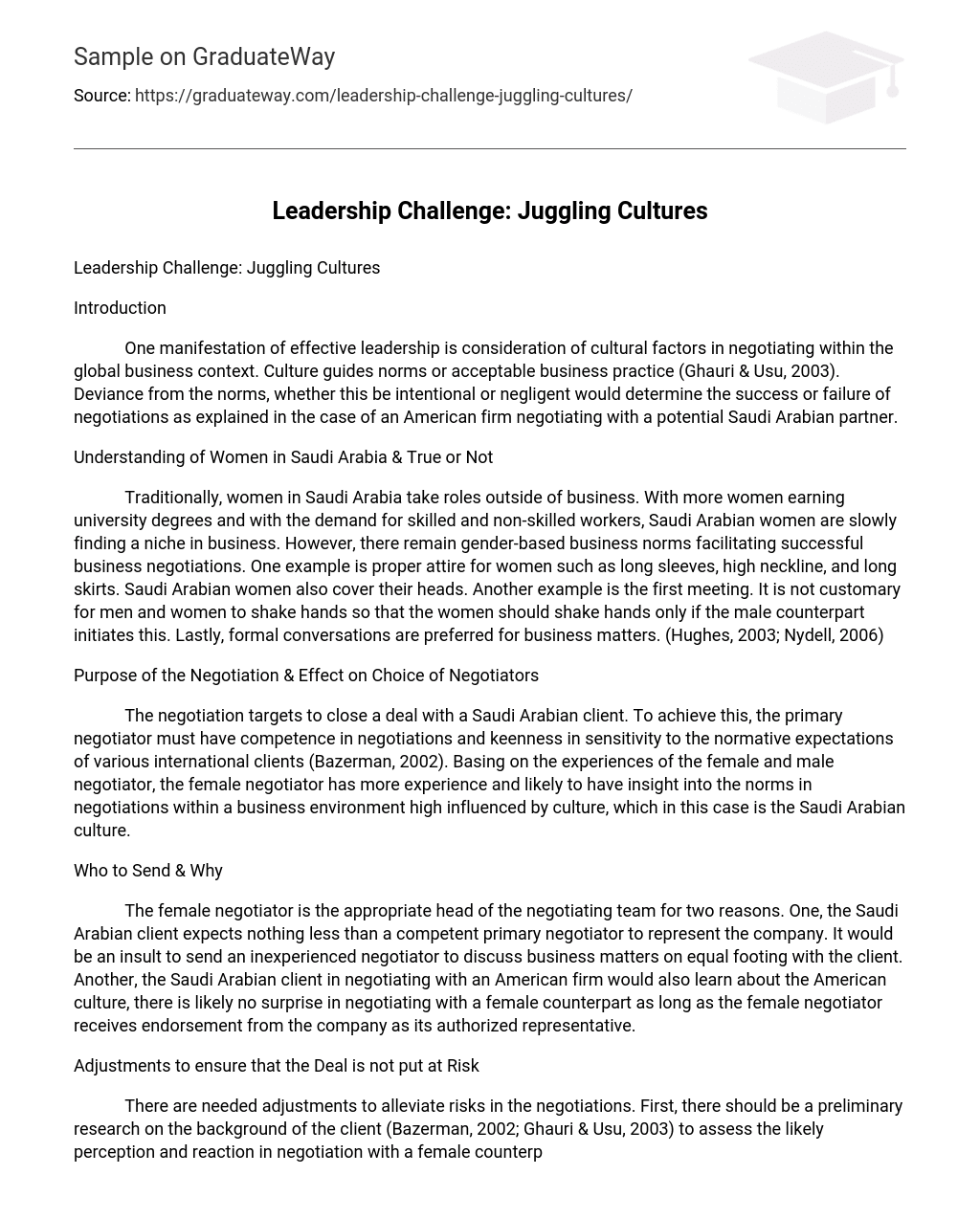Introduction
One manifestation of effective leadership is consideration of cultural factors in negotiating within the global business context. Culture guides norms or acceptable business practice (Ghauri & Usu, 2003). Deviance from the norms, whether this be intentional or negligent would determine the success or failure of negotiations as explained in the case of an American firm negotiating with a potential Saudi Arabian partner.
Understanding of Women in Saudi Arabia & True or Not
Traditionally, women in Saudi Arabia take roles outside of business. With more women earning university degrees and with the demand for skilled and non-skilled workers, Saudi Arabian women are slowly finding a niche in business. However, there remain gender-based business norms facilitating successful business negotiations. One example is proper attire for women such as long sleeves, high neckline, and long skirts. Saudi Arabian women also cover their heads. Another example is the first meeting. It is not customary for men and women to shake hands so that the women should shake hands only if the male counterpart initiates this. Lastly, formal conversations are preferred for business matters. (Hughes, 2003; Nydell, 2006)
Purpose of the Negotiation & Effect on Choice of Negotiators
The negotiation targets to close a deal with a Saudi Arabian client. To achieve this, the primary negotiator must have competence in negotiations and keenness in sensitivity to the normative expectations of various international clients (Bazerman, 2002). Basing on the experiences of the female and male negotiator, the female negotiator has more experience and likely to have insight into the norms in negotiations within a business environment high influenced by culture, which in this case is the Saudi Arabian culture.
Who to Send & Why
The female negotiator is the appropriate head of the negotiating team for two reasons. One, the Saudi Arabian client expects nothing less than a competent primary negotiator to represent the company. It would be an insult to send an inexperienced negotiator to discuss business matters on equal footing with the client. Another, the Saudi Arabian client in negotiating with an American firm would also learn about the American culture, there is likely no surprise in negotiating with a female counterpart as long as the female negotiator receives endorsement from the company as its authorized representative.
Adjustments to ensure that the Deal is not put at Risk
There are needed adjustments to alleviate risks in the negotiations. First, there should be a preliminary research on the background of the client (Bazerman, 2002; Ghauri & Usu, 2003) to assess the likely perception and reaction in negotiation with a female counterpart. Second, the female negotiator and the team members need to adhere to the basic business norms of the Saudi Arabian culture from manner of dress, to language, and interactions.
Implications of the Decision & the Message Sent as a Leader
Deciding to select the female as head of the negotiating team reflects prodigious leadership directed at the interest of the company and its clients. The decision to send the female negotiator is risky but sending the inexperienced male negotiator creates greater risks and uncertainties. Adjustments can minimize the impact of gender on the success of the negotiations but the potential impact of inexperience is much harder to control.
Conclusion
Expertise in the negotiation process supports business success. However, effectiveness during negotiations in the international business context involves multidimensional aspects especially socio-cultural norms embedded in the business culture.
Reference List
Bazerman, M. H. (2002). Judgment in managerial decision making (5th ed.).
Hoboken, NJ: John Wiley & Sons.
Ghauri, P. N., & Usu, J. C. (2003). International business negotiations. Bingley, WA: Emerald Group Publishing.
Hughes, R. (2003). Living & working in the Gulf states & Saudi Arabia: A survival handbook. London: Survival Books Limited.
Nydell, M. K. (2006). Understanding Arabs: A guide for modern times. Boston, MA: Intercultural Press, Inc.





